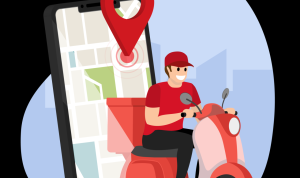Delivery Apps for Holiday Feast Orders offer a modern solution to the age-old challenge of meal preparation during festive seasons. As families gather to celebrate, the convenience of ordering a sumptuous feast from local restaurants and caterers has never been more accessible. The rise of technology has revolutionized the way we plan and enjoy holiday meals, allowing for a variety of culinary options that cater to diverse tastes and dietary restrictions.
With a myriad of apps at our disposal, users can browse menus, customize their orders, and schedule delivery times, ensuring that the holiday spirit remains intact without the stress of cooking. These platforms not only save time but also support local businesses, making it a win-win for all involved during the bustling holiday season.
In recent decades, the increasing prevalence of technology has significantly transformed numerous areas of human life, including communication, education, healthcare, and entertainment. This article aims to explore the multifaceted impacts of technology on society, focusing on its benefits and challenges. As we delve deeper into this topic, we will consider both historical perspectives and contemporary trends, while also examining future implications of technological advancements.The rapid advancement of technology can be traced back to the Industrial Revolution in the 18th and 19th centuries.
This period marked a significant shift from agrarian economies to industrialized societies, fostering innovations such as the steam engine and mechanized manufacturing. As technology progressed, it began to permeate various aspects of daily life, laying the groundwork for the modern technological landscape we navigate today.One of the most notable areas of transformation has been communication. In the past, communication was limited to face-to-face interactions or written correspondence, which often required considerable time and effort.
The advent of the telephone in the late 19th century revolutionized interpersonal communication, enabling instantaneous dialogue over long distances. The introduction of the internet in the late 20th century further accelerated this trend, facilitating global connectivity through emails, social media platforms, and instant messaging services. As a result, individuals can now easily connect with others across the globe, sharing information and fostering relationships that transcend geographical boundaries.Moreover, technology has significantly influenced the educational sector.
The traditional classroom model, characterized by face-to-face instruction and physical textbooks, has evolved dramatically in recent years. The integration of digital tools and online resources into educational curricula has enhanced learning experiences for both students and educators. Online learning platforms, such as Coursera and Khan Academy, have made quality education accessible to individuals irrespective of their location or socio-economic background.
Additionally, technologies like virtual reality (VR) and augmented reality (AR) are being explored as innovative educational tools, providing students with immersive learning experiences that can enhance their understanding of complex subjects.In the realm of healthcare, technology has revolutionized patient care and medical practices. The rise of telemedicine, particularly during the COVID-19 pandemic, exemplifies how technology can bridge gaps in healthcare access.
Patients now have the ability to consult healthcare providers remotely, reducing the need for physical visits and improving access for those in rural or underserved areas. Furthermore, advancements in medical technology, such as robotic surgery, wearable health monitoring devices, and artificial intelligence (AI) algorithms, are optimizing diagnostics, treatment, and patient outcomes. These innovations not only enhance the quality of healthcare but also streamline operations and reduce costs for healthcare providers.While the benefits of technology are undeniable, it is crucial to acknowledge the challenges and potential risks associated with its widespread use.
One significant concern is the digital divide, which refers to the disparities in access to technology and internet connectivity. Individuals from low-income households or marginalized communities often face barriers to accessing the digital tools necessary for participation in the modern economy and society. This divide can perpetuate cycles of inequality, as those without access are at a disadvantage in terms of education, employment opportunities, and social engagement.Furthermore, the rapid pace of technological change raises ethical concerns related to privacy and data security.
The collection and use of personal data by corporations and governments have sparked debates about individuals’ rights to privacy in the digital age. High-profile data breaches and incidents of surveillance have underscored the need for robust data protection regulations and ethical standards in technology development. As technology becomes increasingly integrated into daily life, striking a balance between innovation and privacy will be essential in maintaining public trust.Another challenge posed by technology is the impact on mental health and social well-being.
The pervasive use of social media has been linked to increased feelings of loneliness, anxiety, and depression among users. While these platforms offer opportunities for connection, they can also foster environments of comparison and negativity. It is imperative for individuals to cultivate a healthy relationship with technology, recognizing the importance of setting boundaries and prioritizing face-to-face interactions.As we consider the future of technology, several emerging trends hold the potential to shape society in profound ways.
Artificial intelligence, for instance, continues to advance at an unprecedented pace. With applications ranging from autonomous vehicles to AI-driven customer service solutions, the implications of AI on labor markets and human interaction are vast. While AI can enhance efficiency and productivity, it also raises questions about job displacement and the need for workforce reskilling.Additionally, advancements in biotechnology and genetic engineering promise significant breakthroughs in medicine and agriculture.
The ability to edit genes may lead to treatments for previously incurable diseases and improvements in food production. However, these developments must be approached with caution, as ethical considerations surrounding genetic modification remain contentious.In conclusion, the impact of technology on society is complex and multifaceted, encompassing a wide range of benefits and challenges. From enhancing communication and education to revolutionizing healthcare, technological advancements have transformed the way we live, work, and interact.
However, it is essential to address the accompanying challenges, including the digital divide, data privacy concerns, and the effects on mental health. As we navigate this evolving landscape, a balanced approach that prioritizes ethical considerations and social equity will be crucial in harnessing the full potential of technology for the betterment of society. Through thoughtful engagement and collaboration, we can ensure that technological advancements serve as a force for good, promoting inclusivity and enhancing the quality of life for all individuals.



